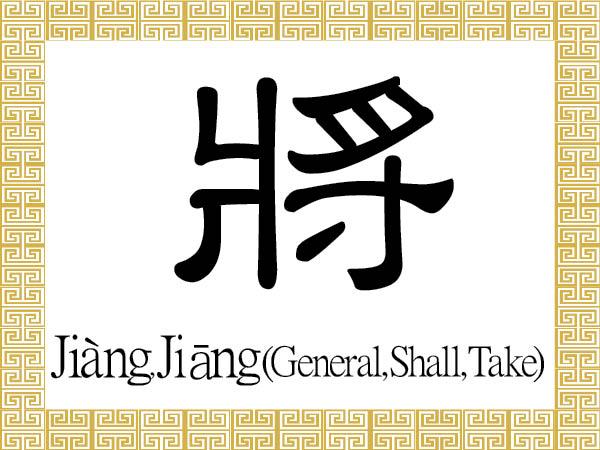When pronounced as jiàng, the Chinese character 將 refers to a general or commander.
When pronounced as jiāng, 將 means shall, will, going to, intend to, or about to, conveying the idea of a future event or action.
Examples of terms that use 將 (jiàng) to indicate a general or commander include 將官 (jiàng guān), military officers; 將士 (jiàng shì), military soldiers and officers of all ranks; and 虎將 (hǔ jiàng), a valiant general, literally a “tiger general.”
In 將軍 (jiāng jūn), however, where 軍 (jūn) refers to army or military, 將 is pronounced as jiāng.
謀臣猛將 (móu chén měng jiàng) describes a court official or minister (臣, chén) who is an expert strategist (謀, móu), together with a general or commander-in-chief (將, jiàng) who is fierce and powerful (猛, měng).
Examples of terms that use 將 (jiāng) to indicate the future include 將來 (jiāng lái), in the future, over the course of time, or about to come; 將近 (jiāng jìn), close to, nearly, or almost; 將去 (jiāng qù), will go, about to go, or in the act of leaving or going; and 將到 (jiāng dào), nearing, approaching, or about to arrive.
將飛翼伏 (jiāng fēi yì fú), literally “when about to (將, jiāng) fly (飛, fēi), the wings (翼, yì) go down (伏, fú),” observes that when a bird is about to take flight, it begins with a powerful downward thrust of its wings, and the wings momentarily appear hidden.
The idiom advises people to similarly be discrete, exercise restraint, and curb any sense of arrogance or superiority when they are about to carry out a major decision or action.
將 (jiāng) is also used as a verb to indicate the meaning of “to take” or “to use.”
The idiom 將心比心 (jiāng xīn bǐ xīn), “take (將, jiāng) one’s heart (心, xīn) and compare with (比, bǐ) another’s heart (心, xīn),” means to put oneself in someone else’s shoes, i.e. to wholeheartedly give thought to the other person and consider the other person’s needs.
將有餘補不足 (jiāng yǒu yú bǔ bù zú) says to “use (將, jiāng) the surplus (有餘, yǒu yú) [from one area] to make up for (補, bǔ) an inadequacy (不足, bù zú) [elsewhere].”
將功贖罪 (jiāng gōng shú zuì) expresses the idea of redeeming or atoning for (贖, shú) a crime (罪, zuì) by performing a meritorious deed or service (功, gōng).
將勤補拙 (jiāng qín bǔ zhuō) refers to compensating for (補, bǔ) a deficiency (拙, zhuō) in skill or ability by being diligent and industrious (勤, qín).
In the expression 日就月將 (rì jiù yuè jiāng), 就 (jiù) refers to accomplishments and 將 (jiāng) refers to progress or improvement. The expression states that by having achievements each and every day (日, rì), one will see progress each and every month (月, yuè).
It depicts a tireless, incessant effort of dedicating oneself to improvement, and indicates that progress comes from steady and incremental success accumulated over a long period of time.




